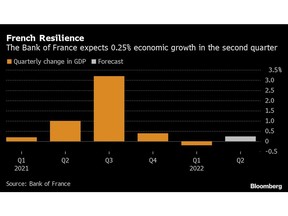(Bloomberg) -- The Bank of France said the economy grew by about 0.25% in the second quarter, despite record inflation, the knock-on effects of Russia’s invasion of Ukraine and growing uncertainty about the outlook for business.

Article content
(Bloomberg) — The Bank of France said the economy grew by about 0.25% in the second quarter, despite record inflation, the knock-on effects of Russia’s invasion of Ukraine and growing uncertainty about the outlook for business.
Advertisement 2
Article content
According to the central bank’s assessment, which is based on a monthly survey of 8,500 firms, industrial activity was stable and services advanced slightly in June. This month, business leaders expect a slight decline in industry and moderate growth in services.
“In an environment marked by the war in Ukraine and the strong tensions on commodities markets, activity continues to resist even if business leaders point to a lackluster outlook,” the central bank said Tuesday.
The short-term appraisal of France’s prospects contrasts with more downbeat predictions for the rest of 2022. The government and the Bank of France have both cut their economic-growth forecasts, implying little further expansion.
It’s not just France. Figures released earlier Tuesday showed investor confidence in Germany’s economy — Europe’s biggest — slumped to the lowest since 2011 as the country looks increasingly set for a recession and risks mount that it’s shut off from Russian natural gas deliveries.
Advertisement 3
Article content
The global squeeze on energy supply that’s triggered shortages and sent power and fuel prices surging may yet get worse, the head of the International Energy Agency said, telling an event in Sydney that “the world has never witnessed” such a major crisis.
In France, Finance Minister Bruno Le Maire has warned that a cutoff of Russian gas is now the most likely scenario and that the state is running out of fiscal space to keep offsetting rising energy prices for firms and households.
Even so, the Bank of France survey showed there’s some indication that inflation pressures may start to ease as the share of business leaders planning to raise prices declined for a second straight month.
“For consumer prices to start declining in the next year, it’s comforting to see pressures are starting to slow,” Bank of France Chief Economist Olivier Garnier said. “I wouldn’t call it a decrease in prices, but an end of the acceleration.”
Advertisement
French Economy Shows Resilience Amid Record Inflation, Ukraine War - Financial Post
Read More
No comments:
Post a Comment